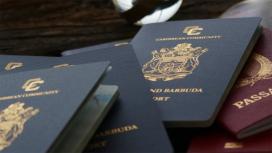Blog • Published on:November 14, 2022 | Updated on:February 18, 2025 • 23 Min
Birthright Citizenship in 2025: Countries, Reforms, and Birth Tourism Trends
Birthright citizenship, or jus soli, is a concept that has been applied for centuries throughout various countries. The premise is simple: those born within a country’s borders are granted direct citizenship.
However, in practice, birthright citizenship can get quite complicated, as each country continues to set its own laws and restrictions. Across continents, families are making choices based on a country’s birthright citizenship regulations.
In this guide, we’ll break down birthright citizenship in 2025: where it’s fully available, where it comes with conditions, and what parents should consider if they’re looking at birthright citizenship as part of a broader mobility strategy.
List of Countries Offering Unrestricted Birthright Citizenship
Despite the growing global debate around birthright citizenship and increasing restrictions in some regions, several countries still uphold pure jus soli—granting automatic citizenship to any child born on their soil, regardless of their parents’ nationality or legal status.
Many of these countries are historically immigration-friendly and see jus soli as a way to maintain inclusive national policies. However, laws can change, particularly in political climates that are increasingly focused on tightening immigration regulations.
Below is a continent-based breakdown of the countries where birthright citizenship remains unrestricted.
What Is Birthright Citizenship?
At its essence, birthright citizenship means that a person’s nationality is determined by their place of birth. There are two main ways this is applied:
- Pure (Unrestricted) Jus Soli – Citizenship is automatically granted to any child born within the country’s borders, regardless of the parents’ nationality, immigration status, or residency.
- Restricted Jus Soli – Birthright citizenship is available, but only if certain conditions are met, such as a parent being a citizen, holding permanent residency, or meeting a minimum residency requirement.
This system contrasts with jus sanguinis (“right of blood”), where nationality is inherited from a parent rather than being determined by birthplace. Many countries today blend both principles, creating a complex web of citizenship laws that vary widely across the world.
Pure vs. Restricted Jus Soli: What’s the Difference?
Unrestricted Birthright Citizenship
- In nations with pure jus soli, a child born on the country’s soil is automatically a citizen.
- This applies even if the parents are temporary visitors, undocumented migrants, or foreign workers on short-term visas.
- No extra requirements, if you’re born in the country, you’re a citizen.
- Parents’ nationality, immigration status, or residency status do not affect the child’s right to citizenship.
- Countries like the United States, Canada, Brazil, and several Caribbean nations still uphold this principle.
Restricted Birthright Citizenship
- Some countries set additional conditions for birthright citizenship. These restrictions are common in parts of Europe, Asia, and Africa, where birthright citizenship has been adjusted to align with broader immigration policies.
- Citizenship isn’t automatic, parents need to meet specific conditions.
- Typically requires at least one parent to be a citizen or a long-term resident.
- Common in Europe, parts of Asia, and Africa, where governments have introduced restrictions to control immigration and population growth.
Many restricted jus soli countries also have exemptions, such as not granting citizenship to children of foreign diplomats or visitors on temporary visas. These rules reflect a country’s broader stance on nationality, migration, and social policies.
Jus Sanguinis: Citizenship by Ancestry
While jus soli focuses on birthplace, jus sanguinis is all about lineage. A child can inherit citizenship from their parents even if born abroad. However, like birthright citizenship, each country has its own rules, which may include:
- Both parents must be citizens for the child to automatically inherit citizenship.
- At least one parent must have been born in the country and hold legal residency.
- The parents must be legally married or have spent a certain number of years in the country.
- The child may need to claim their citizenship before a specific age.
This means that while some individuals are entitled to a second citizenship through their family background, they might still have to go through legal processes to formalize it.
Birth Tourism: A Growing Trend in Global Mobility
The idea of securing a stronger passport and better opportunities for one’s child has led to the rise of birth tourism, a strategic approach where expectant parents travel to a country with jus soli laws to ensure their child acquires automatic citizenship at birth.
In an era of shorter travel times and increased visa accessibility, this practice has gained popularity among globally minded individuals seeking enhanced mobility, economic advantages, and long-term benefits for their children.
How Birth Tourism Works
Birth tourism involves traveling on a temporary visa, typically a tourist or medical visa, to give birth in a country that grants birthright citizenship. Once the child is born, they automatically receive citizenship if the country follows unrestricted jus soli policies.
This strategy not only provides the child with a strong passport and access to education, healthcare, and social benefits, but in some cases, it may also create a pathway to residency or citizenship for the parents.
However, birth tourism is not a loophole, it is a legal process, provided that individuals follow all immigration laws and do not misrepresent their travel intentions.
Top Destinations for Birth Tourism
Among countries that grant unrestricted birthright citizenship, the United States is the most popular choice for birth tourism. With its powerful passport, economic opportunities, and strong legal protections, obtaining U.S. citizenship at birth is considered an exceptional advantage.
- According to estimates from the Center for Immigration Studies, around 33,000 visitors give birth in the U.S. each year while on temporary visas.
- The largest groups of birth tourists in the U.S. come from China, Taiwan, Korea, Nigeria, Turkey, Russia, Brazil, and Mexico.
Other nations with strong passports and jus soli laws, such as Canada and Brazil, have also become notable birth tourism destinations. Canada, in particular, offers birthright citizenship combined with universal healthcare, making it a top choice for parents considering a second citizenship for their child without large medical expenses.
10 Notable Countries Offering Birthright Citizenship
Several countries around the world continue to grant birthright citizenship (jus soli), either unconditionally or with minimal restrictions. In these nations, children born within the country’s borders can acquire citizenship automatically, regardless of their parents’ nationality or immigration status. While some places have introduced conditions, such as requiring parental residency, others maintain a pure jus soli approach, making them attractive options for families considering global mobility.
United States
Birthright citizenship is granted to any child born within U.S. territory, including the 50 states, Washington D.C., and U.S. territories such as Puerto Rico, Guam, and the U.S. Virgin Islands.
- The immigration status or nationality of the parents does not impact eligibility.
- Children of accredited foreign diplomats are excluded from jus soli protections.
- Citizenship is automatic, but parents must register the birth and apply for a U.S. passport.
Canada
- Citizenship is granted automatically to all children born on Canadian soil, including provinces, territories, and surrounding airspace or waters.
- The nationality or immigration status of the parents does not affect eligibility.
- The only exception applies to children of foreign diplomats.
- Birth registration with provincial authorities is required for official documentation.
Brazil
- Any child born in Brazil is entitled to citizenship, regardless of the parents’ nationality or legal status.
- No parental residency or citizenship requirements apply.
- A Brazilian passport offers strong global mobility, making the country a destination for birth tourism.
- Parents must complete standard birth registration to secure citizenship documents for the child.
Argentina
- Citizenship is granted automatically to any child born within Argentina’s borders, without restrictions on parental nationality or residency.
- Argentina’s passport provides strong visa-free travel access and Mercosur benefits.
- Parents must register the birth with local civil authorities for official recognition.
Mexico
- Birthright citizenship applies to all children born within Mexico’s territory, regardless of their parents’ nationality or legal status.
- No residency requirements are imposed on parents.
- Citizenship is constitutionally protected.
- Parents must register the birth with the local civil registry to obtain official documentation.
Jamaica
- All children born in Jamaica are automatically granted citizenship, regardless of their parents’ legal or immigration status.
- Children of foreign diplomats may not qualify under standard jus soli policies.
- Registration with a local civil registry is necessary for official citizenship recognition.
Saint Kitts and Nevis
- Birthright citizenship is automatically granted to any child born within the country’s territory.
- No parental residency or nationality requirements apply.
- Citizenship is officially recognized after birth registration.
- Saint Kitts and Nevis is also known for its Citizenship by Investment program, but children born in the country qualify without financial investment.
Chile
- Any child born in Chile acquires citizenship at birth, regardless of their parents’ immigration status.
- The only exception applies to children of foreign diplomats.
- A Chilean passport provides strong visa-free travel access and Mercosur benefits.
- Parents must complete birth registration with Chilean authorities.
Panama
- Children born in Panama automatically receive citizenship, with no restrictions based on parental nationality or residency.
- Panama’s passport provides significant travel benefits and access to economic opportunities.
- Registration of birth with local authorities is required for official recognition.
Fiji
- Any child born within Fiji’s borders is granted birthright citizenship, without conditions based on parental status.
- There are no residency or nationality requirements for parents.
- Citizenship is confirmed upon birth registration with local authorities.
Requirements and Conditions
For countries with restricted birthright citizenship, common requirements may include:
- Proof of Parental Status: Parents may need to show that one or both of them are citizens, permanent residents, or have been legally residing in the country for a specified duration.
- Legal Documentation: Birth certificates, residency permits, marriage certificates, and other official documents may be required shortly after birth.
- Administrative Registration: Even if the child is entitled to citizenship by law, formal registration processes are often mandated, with deadlines for submitting applications.
- Potential Dual Citizenship Limitations: Some countries restrict holding more than one nationality, compelling the child to renounce other citizenships upon reaching adulthood or by a certain date.
Benefits of Having Birthright Citizenship
Acquiring birthright citizenship in a particular country can offer a range of personal, social, and economic advantages. While circumstances vary greatly depending on the nation, many of the following benefits are commonly associated with birthright citizenship:
Dual Citizenship Possibilities
Birthright citizenship can pave the way for dual or multiple nationalities if the child also inherits a parent’s citizenship via jus sanguinis or if the family seeks additional citizenship through investments, naturalization, or other legal avenues. Multiple passports offer:
- Greater travel freedom, often with visa-free or visa-on-arrival access to numerous countries.
- Increased global mobility for education and employment.
- Potential safety nets in times of political or economic instability.
Travel Freedom
Possessing the citizenship of a country with a strong passport significantly streamlines international travel. For instance, a child born in Canada or the United States can typically visit many nations without a visa. This can also benefit parents who may find it easier to visit or live in a country where their child is a citizen, especially for family reunification purposes.
Educational Opportunities
Many countries offer subsidized or free public education to citizens, from primary school all the way through university. In the United States, for example, in-state tuition rates at public colleges are far more affordable for citizens than for international students. Similarly, many European countries provide low-cost or even tuition-free higher education to their citizens.
Social Benefits
Birthright citizenship can grant access to various social benefits, including public healthcare, social security, unemployment benefits, and other state-sponsored welfare programs. In Canada, for example, citizens typically enjoy universal healthcare coverage funded through taxes. Having a child with birthright citizenship can be advantageous for families, as it may offer a more secure and supportive environment.
Employment Rights
In countries where citizenship status heavily influences legal work opportunities, having citizenship from birth eliminates many bureaucratic obstacles. A citizen can apply for any job without the complexities of work visas or sponsorship, and they often enjoy labor law protections, can join public sector roles, or even run for public office.
The Dual Benefits of Dual Citizenship
While birthright citizenship remains a powerful tool for global mobility, its potential multiplies when combined with citizenship by investment (CBI).
For those who have already secured a second passport through investment, birth tourism becomes an even more strategic option, offering their children the chance to inherit multiple nationalities and, with them, a lifetime of opportunities.
Take, for example, Maltese citizenship by investment. Malta’s passport provides visa-free access to the United States and Canada, two countries that still uphold birthright citizenship policies. In Canada, this also comes with the added advantage of free healthcare.
A family that secures Maltese citizenship can structure their plans so that their child is born in the U.S. or Canada, instantly granting them a third nationality, Maltese, their original nationality, and their newly acquired birthright citizenship.
This strategy eliminates major mobility barriers, giving the child access to multiple economies, education systems, and unrestricted global travel.
Another simplified path to dual citizenship for children comes through the Portuguese Golden Visa program. Investors in Portugal receive a residency permit for themselves and their family members, and while Portugal does not offer unrestricted birthright citizenship, a child born in the country to a Golden Visa holder can become a citizen just one year after birth.
Given that Portugal’s Golden Visa leads to full citizenship after five years with minimal residency requirements (only seven days per year), this route offers families an efficient and strategic way to secure a second citizenship for their children while paving the way for their own future naturalization.
Birthright citizenship on its own is an attractive option, but when combined with citizenship by investment, it becomes a powerful tool reserved for a select few.
By carefully structuring their mobility strategy, families can unlock a world of advantages, providing their children with multiple citizenships, enhanced freedom, and access to some of the strongest passports in the world.
How to Obtain Citizenship by Birth: Key Steps
Whether you’re planning for your child’s future or curious about the steps involved, understanding the practical processes for claiming birthright citizenship is essential. Although the specifics vary from country to country, general procedures and common challenges often overlap.
Documentation Requirements
Regardless of whether a country follows pure or restricted jus soli, parents will usually be required to provide specific documents to register their child’s birth and claim citizenship. Typical documents include:
- Birth Certificate: Official proof of birth location and date.
- Proof of Parental Status: Passports, citizenship certificates, or residency permits that demonstrate the legal status of the parents.
- Marriage Certificate (If Applicable): Some nations ask for a marriage certificate when determining the child’s citizenship rights, though this is more relevant in jus sanguinis contexts.
It’s imperative to complete these registrations and document submissions within the timeframe stipulated by local laws (often within the first few weeks or months of the child’s life).
Registration Processes
In many cases, the process begins at the hospital or local municipal office:
- Hospital Documentation: Parents receive an official record or certificate from the hospital, confirming the time and place of birth.
- Local Civil Registry: Parents then take the hospital documentation to the local civil registry or designated government office. Some countries allow online applications or have dedicated e-services for birth registrations.
- Citizenship Certificate or Passport Application: Once the birth is registered, parents can typically apply for the child’s first passport or citizenship certificate. Processing times vary, from a few days to several months.
Common Challenges
- Language Barriers: In non-English-speaking countries, parents may need the help of translators or legal professionals.
- Lack of Clarity: Certain jurisdictions might have complex rules, leading to confusion about which laws apply, especially for children of expatriates or mixed-nationality couples.
- Delays in Processing: Bureaucratic backlogs can prolong the time it takes to finalize the child’s documentation.
- Legal Conflicts: In some cases, if the parents’ home country does not recognize dual citizenship, parents may face dilemmas regarding renunciation of the child’s other nationality.
Legal Considerations
- Diplomatic Exceptions: Children born to foreign diplomats often do not receive citizenship through jus soli.
- Criminal History of Parents: Rarely, but in some jurisdictions, parental criminal records might complicate birth registration and subsequent claims to citizenship.
- Statelessness Risks: If parents lack citizenship or come from countries that do not confer jus sanguinis effectively, failing to secure birthright citizenship for a newborn can risk leaving the child stateless.
Keeping abreast of local regulations and seeking guidance from legal experts, especially if you’re engaged in “birth tourism,” is essential to avoid any legal pitfalls.
Birthright Citizenship vs. Other Citizenship Options
Birthright citizenship (jus soli) is one of the most straightforward ways to obtain nationality, but it’s not the only route. Many people acquire citizenship through naturalization, investment, or marriage, each with its own advantages and challenges.
Understanding these alternatives can help families make informed decisions about securing a second passport or expanding global mobility.
Naturalization: The Traditional Path to Citizenship
Naturalization is the process through which immigrants become citizens after living in a country for a required number of years. This route often includes meeting language requirements, passing cultural or civic tests, and proving integration into society.
Advantages:
- Demonstrates long-term commitment to the country.
- Citizenship can often be extended to family members.
- Provides full legal rights and protections, similar to those of native-born citizens.
Challenges:
- Long waiting periods, often requiring five to ten years of residency.
- Strict eligibility criteria, including language proficiency and background checks.
- Residency requirements may limit travel and relocation flexibility.
Birthright citizenship, by contrast, is immediate and automatic, but it depends entirely on where the child is born and whether that country allows unrestricted jus soli.
Citizenship by Investment: A Fast-Track Option
For those who can afford it, citizenship by investment (CBI) is one of the fastest ways to obtain a second passport. Countries offering CBI programs typically require a significant financial contribution, such as investing in real estate or government bonds, in exchange for a passport.
Examples of CBI programs:
- Caribbean nations such as St. Kitts and Nevis, Antigua and Barbuda, and Dominica.
- European options like Malta, Portugal (via the Golden Visa), and Austria.
Advantages:
- Fast and direct pathway to citizenship, often within months or a few years.
- Typically extends to family members, including children.
- Provides visa-free travel to desirable destinations and potential tax advantages.
Challenges:
- High financial entry requirements, often in the range of hundreds of thousands of dollars.
- Programs are subject to policy changes, and governments may alter investment thresholds or conditions.
- Public perception of “buying citizenship” may lead to increased scrutiny.
For families already holding a second citizenship through investment, birthright citizenship can be a strategic complement. A child born in a jus soli country can gain an additional nationality, further expanding global mobility options.
Citizenship Through Marriage
Many countries offer a fast-track to citizenship for spouses of citizens, though policies vary widely. While this can be an efficient route for individuals seeking a second nationality, it does not always apply to children.
Advantages:
- Generally a quicker path to citizenship compared to standard naturalization.
- May include residency rights and legal protections before full citizenship is granted.
- Some countries have less stringent residency requirements for spouses.
Challenges:
- Requires legal marriage and proof of a genuine relationship.
- Some countries still impose waiting periods before granting full citizenship.
- Does not always pass citizenship automatically to children, particularly in jus sanguinis nations.
For families looking to expand citizenship options for their children, birthright citizenship is often a more direct solution, as it does not require the legal complexities associated with marriage-based nationality.
How Birthright Citizenship Stands Out
Birthright citizenship offers a unique set of advantages that set it apart from other options.
Advantages:
- Immediate and automatic nationality from birth.
- Potential for dual or multiple citizenships, depending on the child’s parents’ nationalities.
- Provides access to social benefits, education, and employment rights from an early age.
- Can serve as a gateway for parental residency or future naturalization.
Challenges:
- Some countries require the child to choose a nationality upon reaching adulthood if dual citizenship is not allowed.
- Birth tourism can involve costs related to travel, medical expenses, and legal documentation.
- Citizenship laws are politically sensitive, and policies can change, sometimes unpredictably.
Recent Changes in U.S. Birthright Citizenship Laws: The Trump Factor and 2025 Perspectives
Birthright citizenship has long been a cornerstone of American nationality law, protected under the 14th Amendment, which grants U.S. citizenship to nearly all individuals born on U.S. soil. However, in 2025, this fundamental principle is once again under scrutiny.
President Donald Trump has revived his push to limit birthright citizenship, a policy stance he previously championed during his first term. Now, in his latest move, an executive order signed on January 20, 2025, seeks to end automatic citizenship for children born in the U.S. to parents without legal immigration status.
The order argues that the existing interpretation of the 14th Amendment has been misapplied and that citizenship should not be granted automatically to children of undocumented immigrants or those on temporary visas.
This move has triggered an immediate legal and political battle, as birthright citizenship has historically been considered a constitutional right rather than an executive policy that can be altered unilaterally.
What Trump’s Executive Order Means
If successfully implemented, the executive order would dramatically change U.S. immigration and nationality law, shifting the country away from its long-standing jus soli tradition. The proposed restrictions would:
- Prevent children born in the U.S. from automatically receiving citizenship if neither parent is a U.S. citizen or a lawful permanent resident.
- Require parents to provide proof of legal status for their newborn to be eligible for U.S. citizenship.
- Potentially increase statelessness, as children born in the U.S. to undocumented parents may not automatically acquire their parents’ nationality.
This approach mirrors policies seen in several European and Asian nations, where birthright citizenship is conditional rather than absolute.
However, in the U.S., such a change would face immense constitutional hurdles, as the Citizenship Clause of the 14th Amendment has been consistently interpreted by courts to guarantee birthright citizenship regardless of parental status.
Legislative Challenges
Amending the U.S. Constitution or passing significant immigration reform requires substantial consensus in Congress, a high political hurdle. As of 2025, no definitive legislative changes have succeeded in revoking or fundamentally altering the law.
Potential Court Battles
If any executive action is taken to limit jus soli for children of non-citizen parents, experts predict immediate lawsuits that could escalate to the Supreme Court. The outcome would set a significant precedent for future interpretations of birthright citizenship.
Ripple Effects
A high-profile shift in U.S. policy could influence other nations. Countries that already grapple with large immigration flows or birth tourism might feel emboldened to re-examine their own laws or intensify enforcement of restricted jus soli rules.
Overall, the future of birthright citizenship in the United States, and by extension, its global perception, remains uncertain. Nevertheless, the principle of jus soli in the U.S. is deeply rooted in constitutional law, making any radical change a protracted and legally complex endeavor.
Key Considerations for Global Families
As birthright citizenship laws continue to evolve, it is essential for globally mobile individuals and prospective parents to stay informed and make well-planned decisions. While jus soli may seem like a straightforward path to securing a second citizenship, the reality often involves legal nuances, administrative processes, and shifting regulations.
Understanding the Difference
Not all jus soli policies are the same. While some countries offer unrestricted birthright citizenship, others impose residency or parental status requirements. It’s important to research and verify the exact legal framework of the chosen destination.
Consult Reliable Legal Advice
Immigration and nationality laws can be complex, and misinterpretation could lead to complications. If considering birthright citizenship for your child, it is advisable to consult immigration attorneys or government sources to ensure compliance with local regulations.
Monitor Policy Changes
Birthright citizenship remains a politically sensitive issue, especially in countries experiencing debates over immigration policies. Keeping track of legislative developments is crucial, as laws can change quickly, potentially altering eligibility criteria.
Consider Alternatives
For those unable or unwilling to pursue birthright citizenship, alternative pathways such as naturalization, marriage-based citizenship, or investment programs offer viable options. Each route comes with its own advantages, timelines, and requirements, making it important to assess which best aligns with long-term mobility goals.
Securing a Global Future
Birthright citizenship remains one of the most powerful ways to unlock opportunities for a child, providing access to education, healthcare, employment rights, and expanded travel freedom.
However, as laws shift and debates continue, careful planning is essential to ensure compliance with evolving policies.
For families looking to secure a second citizenship through birth or other legal pathways, understanding the options and taking a strategic approach can make all the difference.
To know more about birthright citizenship, contact us today to talk with one of our second citizenship experts.
FAQs About Birthright Citizenship Countries
In this section, we address some of the most frequently asked questions regarding countries that offer birthright citizenship, either purely or with certain restrictions. While every case can differ based on personal circumstances, these answers aim to clarify common queries.
Does My Child Automatically Get Citizenship If Born in a ‘Pure Jus Soli’ Country?
Yes, in countries with pure jus soli (e.g., the U.S., Canada, Brazil), any child born on the territory is typically a citizen at birth, regardless of the parents’ immigration status or nationality. However, diplomatic exceptions might apply.
What If I’m Just Visiting a Country Temporarily?
In pure jus soli nations, temporary or tourist status of the parents usually does not impede the child from acquiring citizenship. However, parents should be aware of any local rules about obtaining medical insurance, covering birth expenses, or any special regulations about pregnancy-related travel.
Can I Register My Child’s Birth at My Country’s Embassy If They’re Born Abroad?
Yes. Most embassies offer consular services to register births abroad, thereby ensuring the child also inherits the parents’ citizenship under jus sanguinis (if allowed by the parents’ home country). This process does not negate birthright citizenship from the host country if it is a pure or restricted jus soli jurisdiction.
Do I Need a Specific Visa to Give Birth in Another Country?
It depends on the country. Some nations require a valid medical visa or pre-approval for birth-related stays. For instance, the U.S. typically scrutinizes B2 (tourist) visa applications more heavily if the applicant is clearly in late pregnancy. Failure to disclose pregnancy or the intent to give birth may lead to complications at the port of entry.
Can My Child Have Dual or Multiple Citizenships?
This varies. Some countries allow multiple nationalities without restrictions, while others require renunciation of prior citizenship(s) upon adulthood. Always check both the host country’s and your home country’s laws regarding dual citizenship.
How Much Does It Cost to Obtain Birthright Citizenship for My Child?
Technically, citizenship via jus soli is not a product you “purchase”, the main costs are related to childbirth expenses (hospital fees, travel costs, accommodation) and administrative fees for documentation. In countries like Canada with publicly funded healthcare, giving birth can still incur substantial expenses for non-residents. Travel, lodging, and any legal consultation fees add to the overall expenditure.
Could My Child Lose Birthright Citizenship Later?
Most countries do not strip citizenship from individuals who obtained it at birth unless there is a case of fraud or misrepresentation of facts. However, if your child also holds another nationality, some states might ask them to choose one citizenship upon reaching the age of majority. Instances of revocation remain rare and typically involve serious legal grounds.
Is Birthright Citizenship the Same Everywhere?
No. While the concept of jus soli is universal, granting citizenship based on location of birth, implementation varies widely. Each country enacts its own rules, exceptions, and eligibility criteria, so outcomes differ significantly from one jurisdiction to another.
References
Government of Canada. (n.d.). Born in Canada. Immigration, Refugees and Citizenship Canada. https://www.canada.ca/en/immigration-refugees-citizenship/services/canadian-citizenship/born-canada.html
U.S. Department of State. (n.d.). Acquisition of U.S. citizenship by birth. https://travel.state.gov/content/travel/en/legal/travel-legal-considerations/us-citizenship-laws-policies.html
Center for Immigration Studies. (2023). Birth tourism. https://cis.org/Topic/Birth-Tourism
Government of Brazil, Ministry of Foreign Affairs. (n.d.). Nationality and naturalization.http://www.portalconsular.itamaraty.gov.br (Navigate to “Nationality and Naturalization” section.)
Portuguese Immigration and Borders Service (SEF). (n.d.). Portuguese nationality by birth: Requirements and processes. https://imigrante.sef.pt/en/ (Navigate to “Nationality” section.)
Written By

Laura Weber
Laura Weber is a legal expert in international tax planning and citizenship by investment. With over a decade of experience, Laura helps individuals and families navigate complex legal frameworks to secure dual citizenship and global residency options, particularly in the Caribbean and Europe.
Related Articles









Recently Published









Book a free consultation


